Holmes Institute: Business and Corporate Law Case Study Assignment
VerifiedAdded on 2022/11/07
|9
|2475
|187
Homework Assignment
AI Summary
This document presents a comprehensive solution to a business law assignment, addressing two case studies related to contract law and corporate law. Part A analyzes a contract law scenario, examining issues of offer, acceptance, and the formation of a valid contract, citing relevant case law such as *Australian Woollen Mills Pty Ltd v The Commonwealth* and *Hyde v. Wrench*. The analysis explores the intentions of parties, counteroffers, and the communication of acceptance, ultimately concluding with the formation of a binding contract. Part B delves into corporate law, focusing on directors' duties and potential liabilities under the Corporations Act 2001 (Cth). It examines the breaches of duty of care and diligence, as well as the application of the business judgment rule, referencing cases such as *ASIC v Cassimatis* and *ASIC v Rich*. The case study also considers the implications of company insolvency and director's responsibilities under section 588G, concluding with a discussion of potential breaches and liabilities of the directors involved.
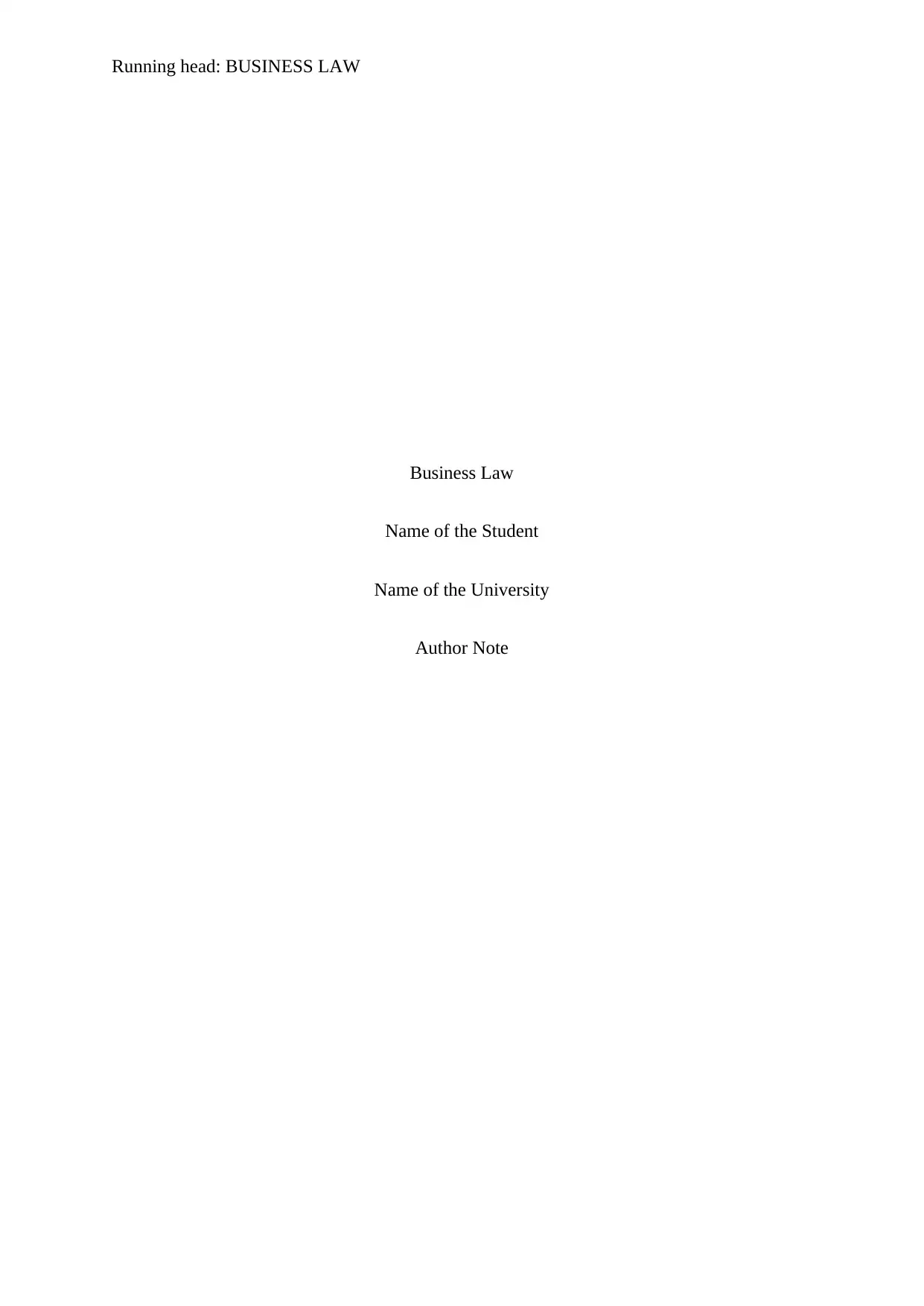
Running head: BUSINESS LAW
Business Law
Name of the Student
Name of the University
Author Note
Business Law
Name of the Student
Name of the University
Author Note
Paraphrase This Document
Need a fresh take? Get an instant paraphrase of this document with our AI Paraphraser
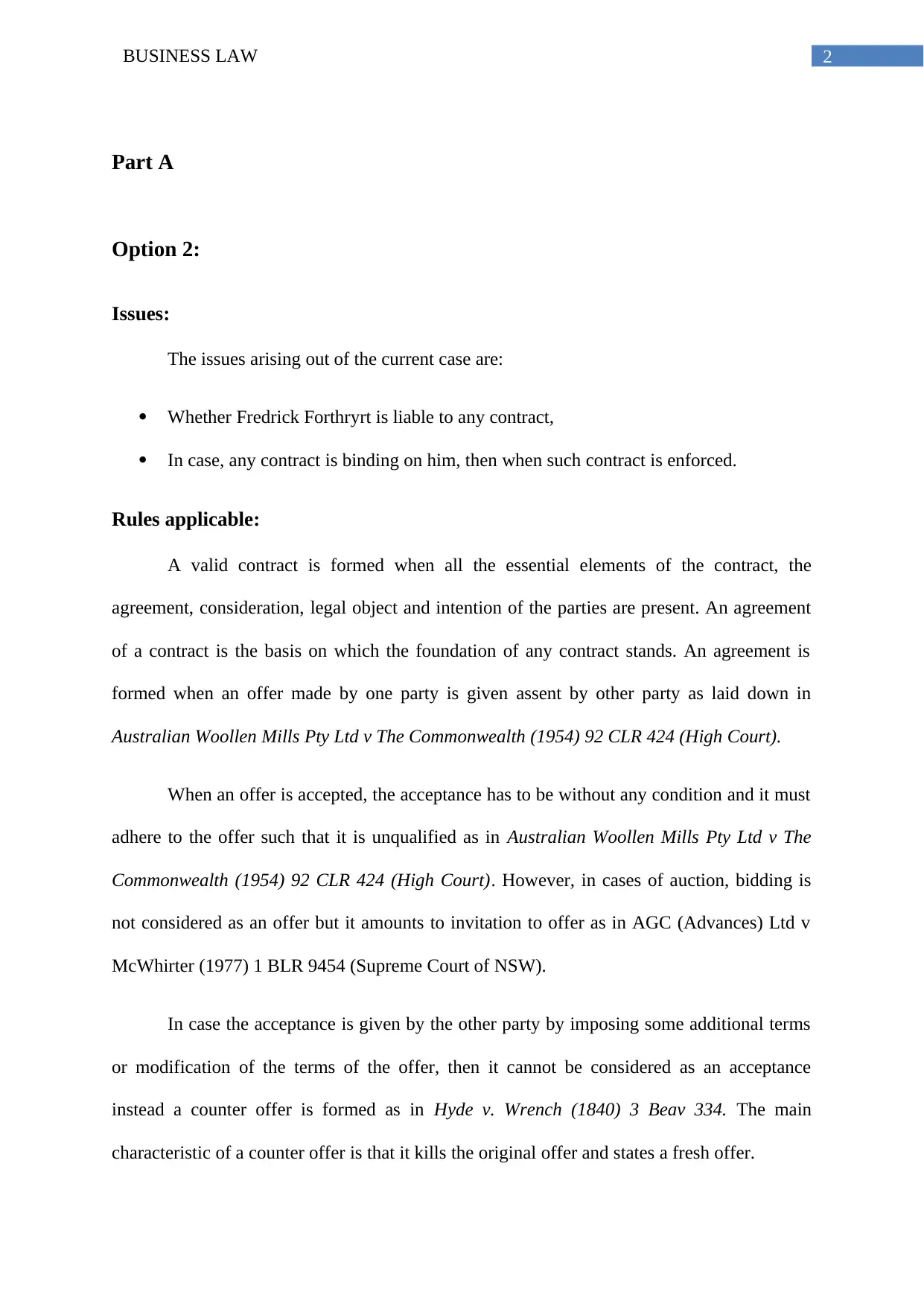
2BUSINESS LAW
Part A
Option 2:
Issues:
The issues arising out of the current case are:
Whether Fredrick Forthryrt is liable to any contract,
In case, any contract is binding on him, then when such contract is enforced.
Rules applicable:
A valid contract is formed when all the essential elements of the contract, the
agreement, consideration, legal object and intention of the parties are present. An agreement
of a contract is the basis on which the foundation of any contract stands. An agreement is
formed when an offer made by one party is given assent by other party as laid down in
Australian Woollen Mills Pty Ltd v The Commonwealth (1954) 92 CLR 424 (High Court).
When an offer is accepted, the acceptance has to be without any condition and it must
adhere to the offer such that it is unqualified as in Australian Woollen Mills Pty Ltd v The
Commonwealth (1954) 92 CLR 424 (High Court). However, in cases of auction, bidding is
not considered as an offer but it amounts to invitation to offer as in AGC (Advances) Ltd v
McWhirter (1977) 1 BLR 9454 (Supreme Court of NSW).
In case the acceptance is given by the other party by imposing some additional terms
or modification of the terms of the offer, then it cannot be considered as an acceptance
instead a counter offer is formed as in Hyde v. Wrench (1840) 3 Beav 334. The main
characteristic of a counter offer is that it kills the original offer and states a fresh offer.
Part A
Option 2:
Issues:
The issues arising out of the current case are:
Whether Fredrick Forthryrt is liable to any contract,
In case, any contract is binding on him, then when such contract is enforced.
Rules applicable:
A valid contract is formed when all the essential elements of the contract, the
agreement, consideration, legal object and intention of the parties are present. An agreement
of a contract is the basis on which the foundation of any contract stands. An agreement is
formed when an offer made by one party is given assent by other party as laid down in
Australian Woollen Mills Pty Ltd v The Commonwealth (1954) 92 CLR 424 (High Court).
When an offer is accepted, the acceptance has to be without any condition and it must
adhere to the offer such that it is unqualified as in Australian Woollen Mills Pty Ltd v The
Commonwealth (1954) 92 CLR 424 (High Court). However, in cases of auction, bidding is
not considered as an offer but it amounts to invitation to offer as in AGC (Advances) Ltd v
McWhirter (1977) 1 BLR 9454 (Supreme Court of NSW).
In case the acceptance is given by the other party by imposing some additional terms
or modification of the terms of the offer, then it cannot be considered as an acceptance
instead a counter offer is formed as in Hyde v. Wrench (1840) 3 Beav 334. The main
characteristic of a counter offer is that it kills the original offer and states a fresh offer.
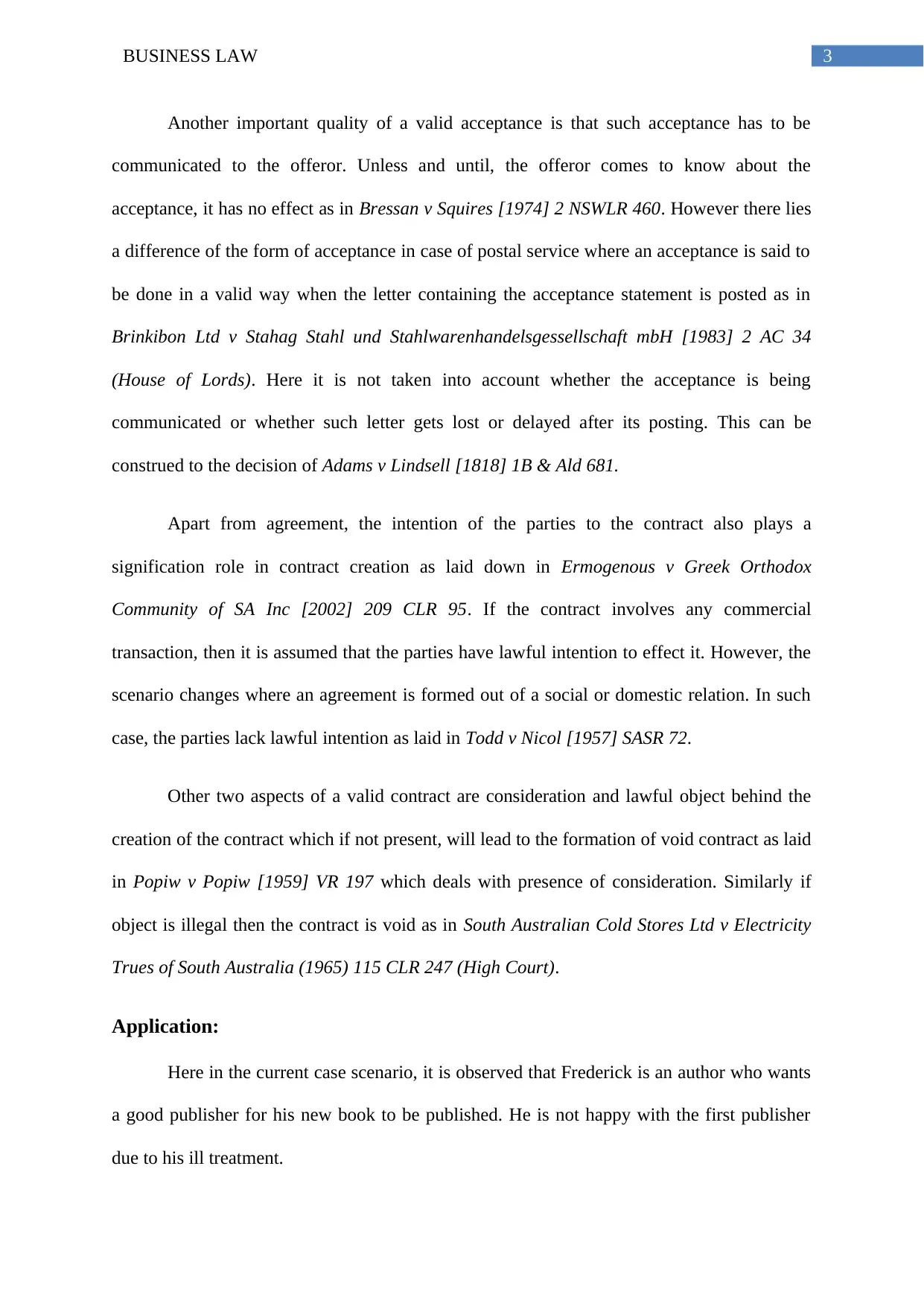
3BUSINESS LAW
Another important quality of a valid acceptance is that such acceptance has to be
communicated to the offeror. Unless and until, the offeror comes to know about the
acceptance, it has no effect as in Bressan v Squires [1974] 2 NSWLR 460. However there lies
a difference of the form of acceptance in case of postal service where an acceptance is said to
be done in a valid way when the letter containing the acceptance statement is posted as in
Brinkibon Ltd v Stahag Stahl und Stahlwarenhandelsgessellschaft mbH [1983] 2 AC 34
(House of Lords). Here it is not taken into account whether the acceptance is being
communicated or whether such letter gets lost or delayed after its posting. This can be
construed to the decision of Adams v Lindsell [1818] 1B & Ald 681.
Apart from agreement, the intention of the parties to the contract also plays a
signification role in contract creation as laid down in Ermogenous v Greek Orthodox
Community of SA Inc [2002] 209 CLR 95. If the contract involves any commercial
transaction, then it is assumed that the parties have lawful intention to effect it. However, the
scenario changes where an agreement is formed out of a social or domestic relation. In such
case, the parties lack lawful intention as laid in Todd v Nicol [1957] SASR 72.
Other two aspects of a valid contract are consideration and lawful object behind the
creation of the contract which if not present, will lead to the formation of void contract as laid
in Popiw v Popiw [1959] VR 197 which deals with presence of consideration. Similarly if
object is illegal then the contract is void as in South Australian Cold Stores Ltd v Electricity
Trues of South Australia (1965) 115 CLR 247 (High Court).
Application:
Here in the current case scenario, it is observed that Frederick is an author who wants
a good publisher for his new book to be published. He is not happy with the first publisher
due to his ill treatment.
Another important quality of a valid acceptance is that such acceptance has to be
communicated to the offeror. Unless and until, the offeror comes to know about the
acceptance, it has no effect as in Bressan v Squires [1974] 2 NSWLR 460. However there lies
a difference of the form of acceptance in case of postal service where an acceptance is said to
be done in a valid way when the letter containing the acceptance statement is posted as in
Brinkibon Ltd v Stahag Stahl und Stahlwarenhandelsgessellschaft mbH [1983] 2 AC 34
(House of Lords). Here it is not taken into account whether the acceptance is being
communicated or whether such letter gets lost or delayed after its posting. This can be
construed to the decision of Adams v Lindsell [1818] 1B & Ald 681.
Apart from agreement, the intention of the parties to the contract also plays a
signification role in contract creation as laid down in Ermogenous v Greek Orthodox
Community of SA Inc [2002] 209 CLR 95. If the contract involves any commercial
transaction, then it is assumed that the parties have lawful intention to effect it. However, the
scenario changes where an agreement is formed out of a social or domestic relation. In such
case, the parties lack lawful intention as laid in Todd v Nicol [1957] SASR 72.
Other two aspects of a valid contract are consideration and lawful object behind the
creation of the contract which if not present, will lead to the formation of void contract as laid
in Popiw v Popiw [1959] VR 197 which deals with presence of consideration. Similarly if
object is illegal then the contract is void as in South Australian Cold Stores Ltd v Electricity
Trues of South Australia (1965) 115 CLR 247 (High Court).
Application:
Here in the current case scenario, it is observed that Frederick is an author who wants
a good publisher for his new book to be published. He is not happy with the first publisher
due to his ill treatment.
⊘ This is a preview!⊘
Do you want full access?
Subscribe today to unlock all pages.

Trusted by 1+ million students worldwide
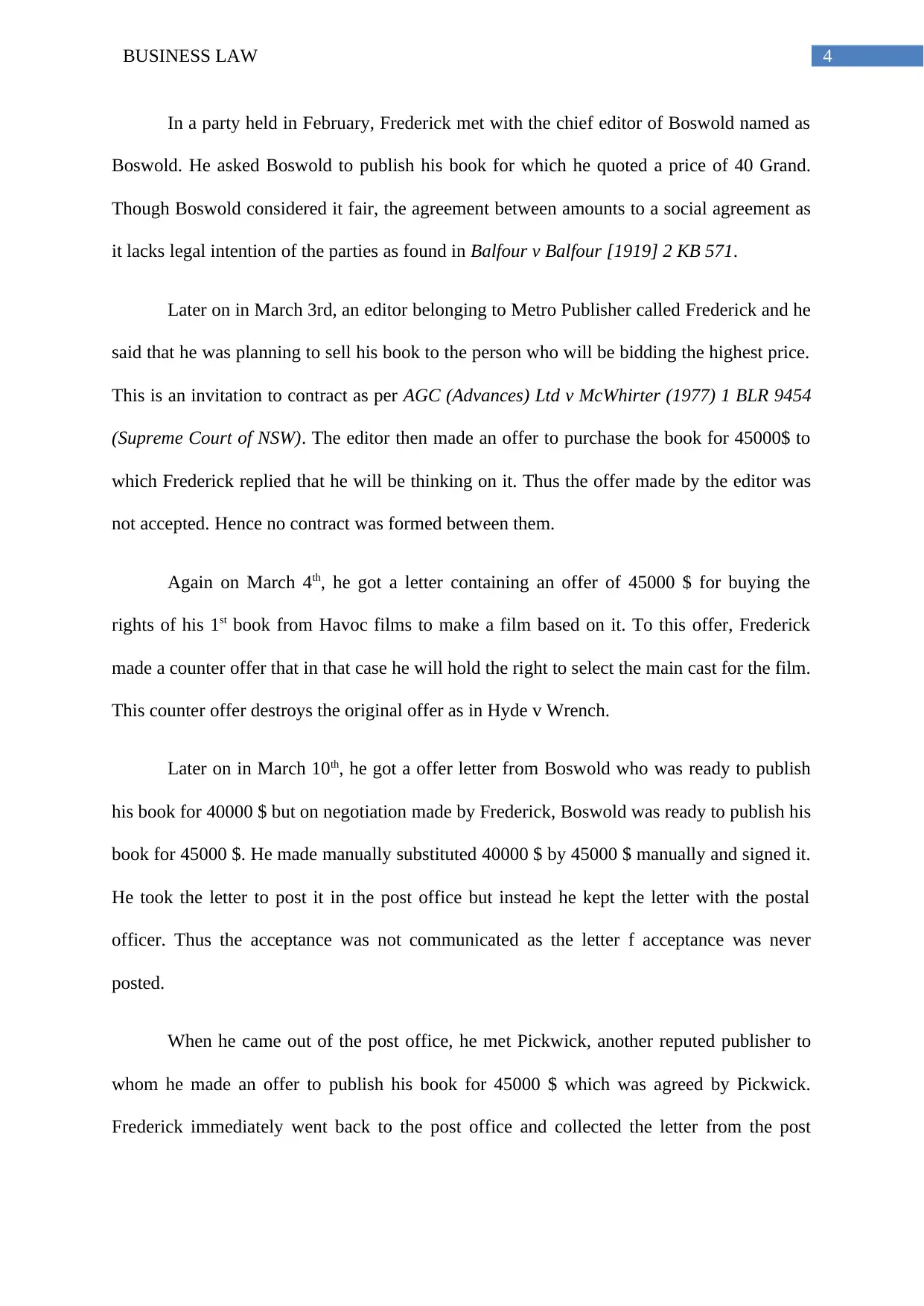
4BUSINESS LAW
In a party held in February, Frederick met with the chief editor of Boswold named as
Boswold. He asked Boswold to publish his book for which he quoted a price of 40 Grand.
Though Boswold considered it fair, the agreement between amounts to a social agreement as
it lacks legal intention of the parties as found in Balfour v Balfour [1919] 2 KB 571.
Later on in March 3rd, an editor belonging to Metro Publisher called Frederick and he
said that he was planning to sell his book to the person who will be bidding the highest price.
This is an invitation to contract as per AGC (Advances) Ltd v McWhirter (1977) 1 BLR 9454
(Supreme Court of NSW). The editor then made an offer to purchase the book for 45000$ to
which Frederick replied that he will be thinking on it. Thus the offer made by the editor was
not accepted. Hence no contract was formed between them.
Again on March 4th, he got a letter containing an offer of 45000 $ for buying the
rights of his 1st book from Havoc films to make a film based on it. To this offer, Frederick
made a counter offer that in that case he will hold the right to select the main cast for the film.
This counter offer destroys the original offer as in Hyde v Wrench.
Later on in March 10th, he got a offer letter from Boswold who was ready to publish
his book for 40000 $ but on negotiation made by Frederick, Boswold was ready to publish his
book for 45000 $. He made manually substituted 40000 $ by 45000 $ manually and signed it.
He took the letter to post it in the post office but instead he kept the letter with the postal
officer. Thus the acceptance was not communicated as the letter f acceptance was never
posted.
When he came out of the post office, he met Pickwick, another reputed publisher to
whom he made an offer to publish his book for 45000 $ which was agreed by Pickwick.
Frederick immediately went back to the post office and collected the letter from the post
In a party held in February, Frederick met with the chief editor of Boswold named as
Boswold. He asked Boswold to publish his book for which he quoted a price of 40 Grand.
Though Boswold considered it fair, the agreement between amounts to a social agreement as
it lacks legal intention of the parties as found in Balfour v Balfour [1919] 2 KB 571.
Later on in March 3rd, an editor belonging to Metro Publisher called Frederick and he
said that he was planning to sell his book to the person who will be bidding the highest price.
This is an invitation to contract as per AGC (Advances) Ltd v McWhirter (1977) 1 BLR 9454
(Supreme Court of NSW). The editor then made an offer to purchase the book for 45000$ to
which Frederick replied that he will be thinking on it. Thus the offer made by the editor was
not accepted. Hence no contract was formed between them.
Again on March 4th, he got a letter containing an offer of 45000 $ for buying the
rights of his 1st book from Havoc films to make a film based on it. To this offer, Frederick
made a counter offer that in that case he will hold the right to select the main cast for the film.
This counter offer destroys the original offer as in Hyde v Wrench.
Later on in March 10th, he got a offer letter from Boswold who was ready to publish
his book for 40000 $ but on negotiation made by Frederick, Boswold was ready to publish his
book for 45000 $. He made manually substituted 40000 $ by 45000 $ manually and signed it.
He took the letter to post it in the post office but instead he kept the letter with the postal
officer. Thus the acceptance was not communicated as the letter f acceptance was never
posted.
When he came out of the post office, he met Pickwick, another reputed publisher to
whom he made an offer to publish his book for 45000 $ which was agreed by Pickwick.
Frederick immediately went back to the post office and collected the letter from the post
Paraphrase This Document
Need a fresh take? Get an instant paraphrase of this document with our AI Paraphraser
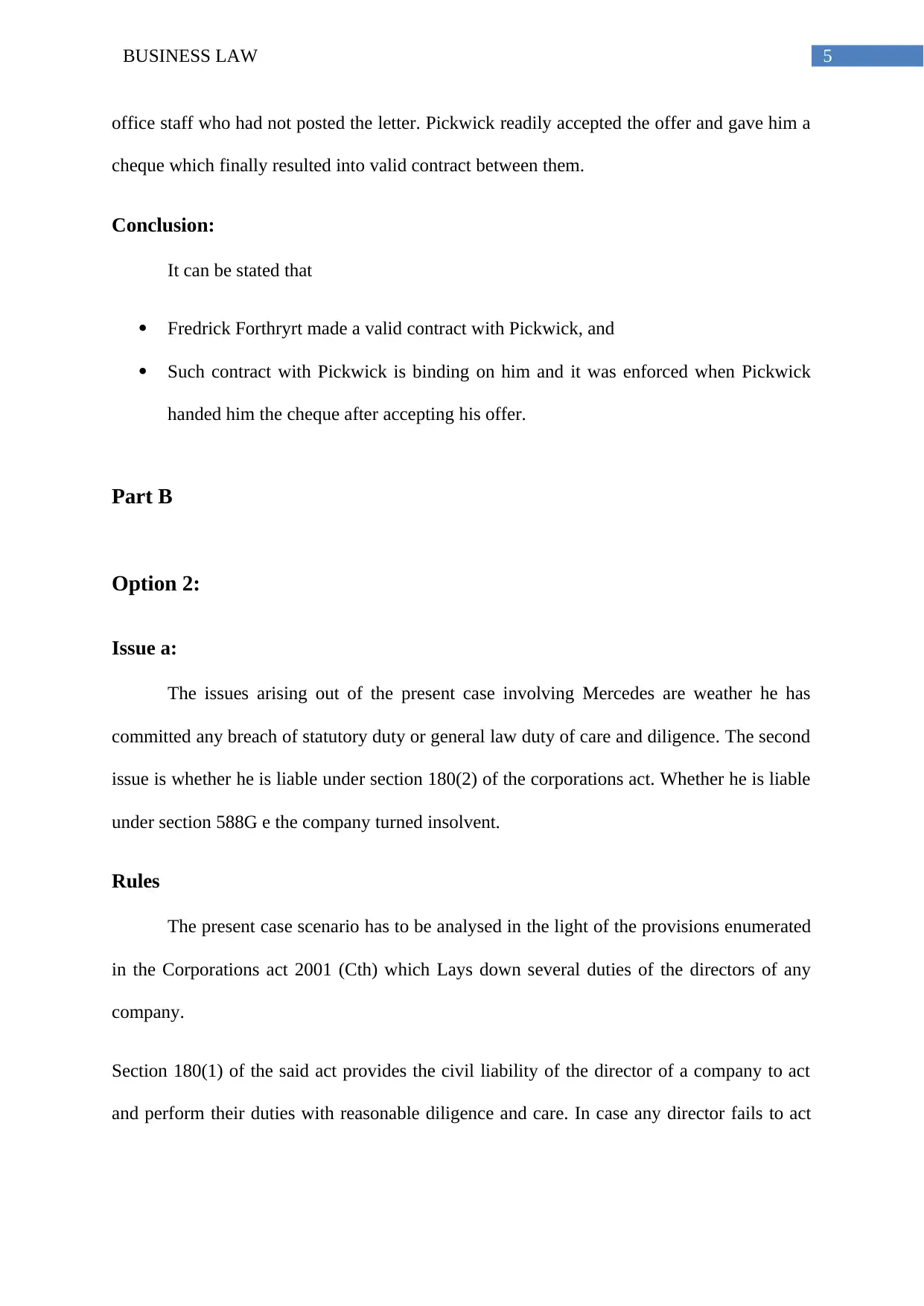
5BUSINESS LAW
office staff who had not posted the letter. Pickwick readily accepted the offer and gave him a
cheque which finally resulted into valid contract between them.
Conclusion:
It can be stated that
Fredrick Forthryrt made a valid contract with Pickwick, and
Such contract with Pickwick is binding on him and it was enforced when Pickwick
handed him the cheque after accepting his offer.
Part B
Option 2:
Issue a:
The issues arising out of the present case involving Mercedes are weather he has
committed any breach of statutory duty or general law duty of care and diligence. The second
issue is whether he is liable under section 180(2) of the corporations act. Whether he is liable
under section 588G e the company turned insolvent.
Rules
The present case scenario has to be analysed in the light of the provisions enumerated
in the Corporations act 2001 (Cth) which Lays down several duties of the directors of any
company.
Section 180(1) of the said act provides the civil liability of the director of a company to act
and perform their duties with reasonable diligence and care. In case any director fails to act
office staff who had not posted the letter. Pickwick readily accepted the offer and gave him a
cheque which finally resulted into valid contract between them.
Conclusion:
It can be stated that
Fredrick Forthryrt made a valid contract with Pickwick, and
Such contract with Pickwick is binding on him and it was enforced when Pickwick
handed him the cheque after accepting his offer.
Part B
Option 2:
Issue a:
The issues arising out of the present case involving Mercedes are weather he has
committed any breach of statutory duty or general law duty of care and diligence. The second
issue is whether he is liable under section 180(2) of the corporations act. Whether he is liable
under section 588G e the company turned insolvent.
Rules
The present case scenario has to be analysed in the light of the provisions enumerated
in the Corporations act 2001 (Cth) which Lays down several duties of the directors of any
company.
Section 180(1) of the said act provides the civil liability of the director of a company to act
and perform their duties with reasonable diligence and care. In case any director fails to act
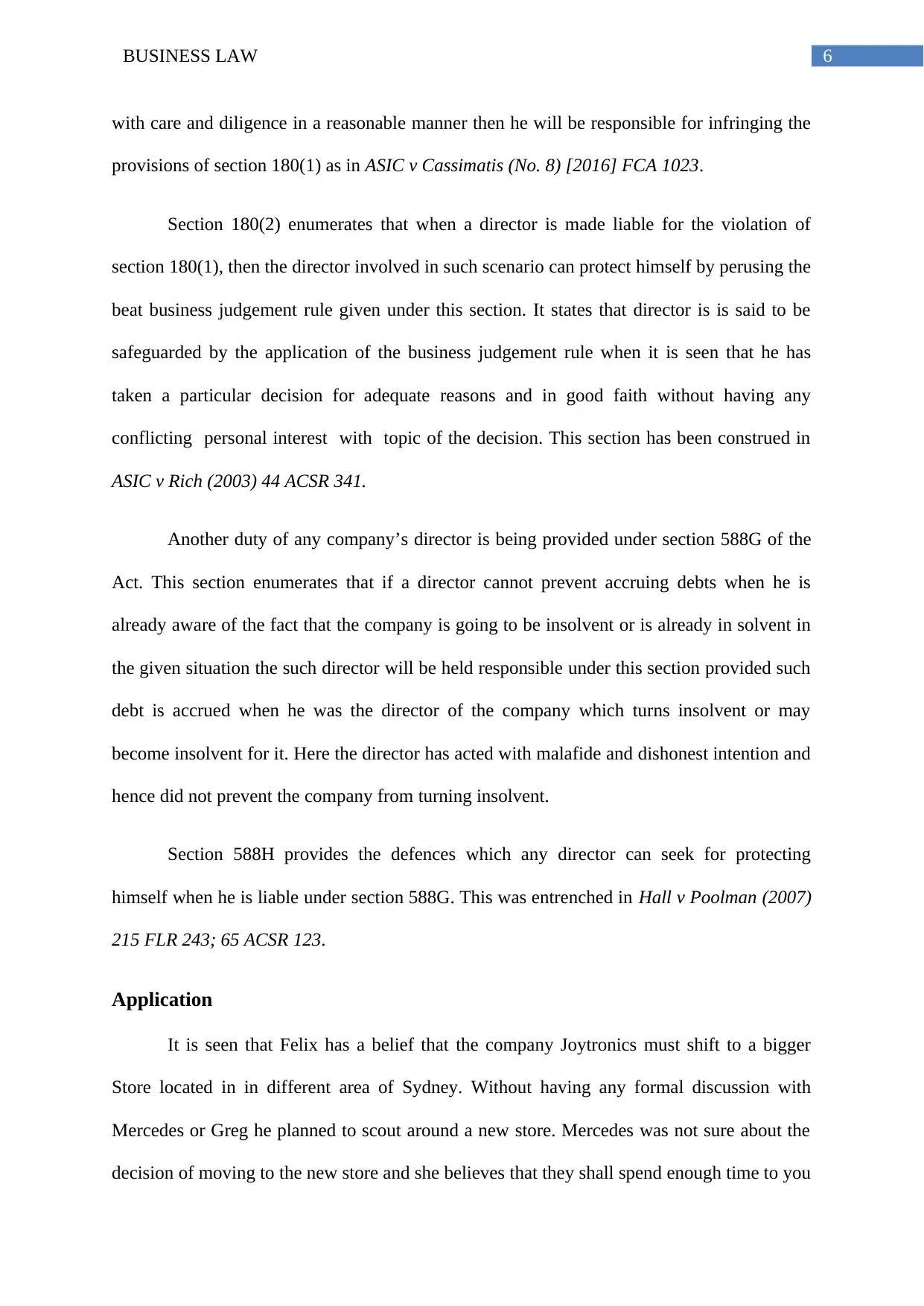
6BUSINESS LAW
with care and diligence in a reasonable manner then he will be responsible for infringing the
provisions of section 180(1) as in ASIC v Cassimatis (No. 8) [2016] FCA 1023.
Section 180(2) enumerates that when a director is made liable for the violation of
section 180(1), then the director involved in such scenario can protect himself by perusing the
beat business judgement rule given under this section. It states that director is is said to be
safeguarded by the application of the business judgement rule when it is seen that he has
taken a particular decision for adequate reasons and in good faith without having any
conflicting personal interest with topic of the decision. This section has been construed in
ASIC v Rich (2003) 44 ACSR 341.
Another duty of any company’s director is being provided under section 588G of the
Act. This section enumerates that if a director cannot prevent accruing debts when he is
already aware of the fact that the company is going to be insolvent or is already in solvent in
the given situation the such director will be held responsible under this section provided such
debt is accrued when he was the director of the company which turns insolvent or may
become insolvent for it. Here the director has acted with malafide and dishonest intention and
hence did not prevent the company from turning insolvent.
Section 588H provides the defences which any director can seek for protecting
himself when he is liable under section 588G. This was entrenched in Hall v Poolman (2007)
215 FLR 243; 65 ACSR 123.
Application
It is seen that Felix has a belief that the company Joytronics must shift to a bigger
Store located in in different area of Sydney. Without having any formal discussion with
Mercedes or Greg he planned to scout around a new store. Mercedes was not sure about the
decision of moving to the new store and she believes that they shall spend enough time to you
with care and diligence in a reasonable manner then he will be responsible for infringing the
provisions of section 180(1) as in ASIC v Cassimatis (No. 8) [2016] FCA 1023.
Section 180(2) enumerates that when a director is made liable for the violation of
section 180(1), then the director involved in such scenario can protect himself by perusing the
beat business judgement rule given under this section. It states that director is is said to be
safeguarded by the application of the business judgement rule when it is seen that he has
taken a particular decision for adequate reasons and in good faith without having any
conflicting personal interest with topic of the decision. This section has been construed in
ASIC v Rich (2003) 44 ACSR 341.
Another duty of any company’s director is being provided under section 588G of the
Act. This section enumerates that if a director cannot prevent accruing debts when he is
already aware of the fact that the company is going to be insolvent or is already in solvent in
the given situation the such director will be held responsible under this section provided such
debt is accrued when he was the director of the company which turns insolvent or may
become insolvent for it. Here the director has acted with malafide and dishonest intention and
hence did not prevent the company from turning insolvent.
Section 588H provides the defences which any director can seek for protecting
himself when he is liable under section 588G. This was entrenched in Hall v Poolman (2007)
215 FLR 243; 65 ACSR 123.
Application
It is seen that Felix has a belief that the company Joytronics must shift to a bigger
Store located in in different area of Sydney. Without having any formal discussion with
Mercedes or Greg he planned to scout around a new store. Mercedes was not sure about the
decision of moving to the new store and she believes that they shall spend enough time to you
⊘ This is a preview!⊘
Do you want full access?
Subscribe today to unlock all pages.

Trusted by 1+ million students worldwide
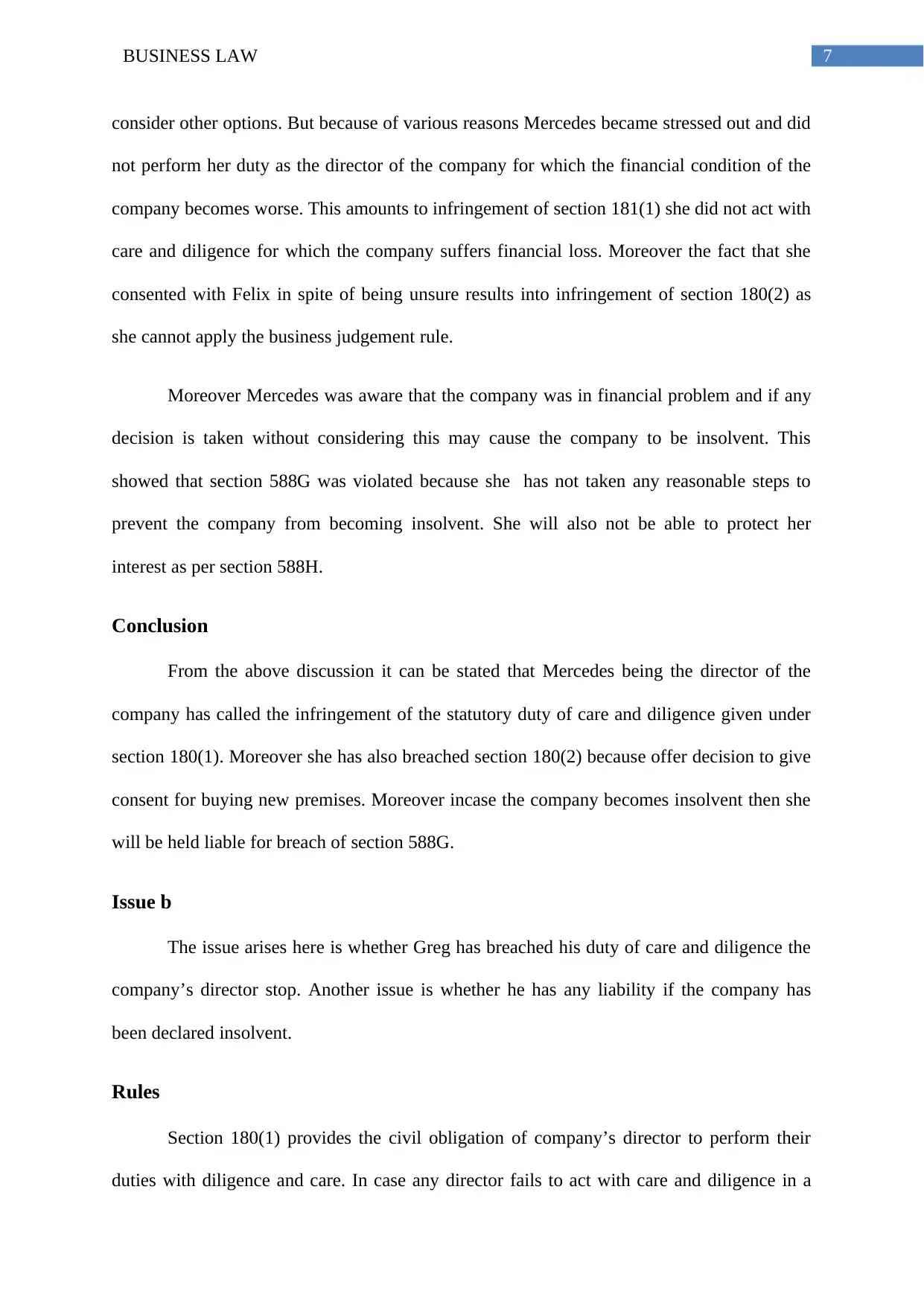
7BUSINESS LAW
consider other options. But because of various reasons Mercedes became stressed out and did
not perform her duty as the director of the company for which the financial condition of the
company becomes worse. This amounts to infringement of section 181(1) she did not act with
care and diligence for which the company suffers financial loss. Moreover the fact that she
consented with Felix in spite of being unsure results into infringement of section 180(2) as
she cannot apply the business judgement rule.
Moreover Mercedes was aware that the company was in financial problem and if any
decision is taken without considering this may cause the company to be insolvent. This
showed that section 588G was violated because she has not taken any reasonable steps to
prevent the company from becoming insolvent. She will also not be able to protect her
interest as per section 588H.
Conclusion
From the above discussion it can be stated that Mercedes being the director of the
company has called the infringement of the statutory duty of care and diligence given under
section 180(1). Moreover she has also breached section 180(2) because offer decision to give
consent for buying new premises. Moreover incase the company becomes insolvent then she
will be held liable for breach of section 588G.
Issue b
The issue arises here is whether Greg has breached his duty of care and diligence the
company’s director stop. Another issue is whether he has any liability if the company has
been declared insolvent.
Rules
Section 180(1) provides the civil obligation of company’s director to perform their
duties with diligence and care. In case any director fails to act with care and diligence in a
consider other options. But because of various reasons Mercedes became stressed out and did
not perform her duty as the director of the company for which the financial condition of the
company becomes worse. This amounts to infringement of section 181(1) she did not act with
care and diligence for which the company suffers financial loss. Moreover the fact that she
consented with Felix in spite of being unsure results into infringement of section 180(2) as
she cannot apply the business judgement rule.
Moreover Mercedes was aware that the company was in financial problem and if any
decision is taken without considering this may cause the company to be insolvent. This
showed that section 588G was violated because she has not taken any reasonable steps to
prevent the company from becoming insolvent. She will also not be able to protect her
interest as per section 588H.
Conclusion
From the above discussion it can be stated that Mercedes being the director of the
company has called the infringement of the statutory duty of care and diligence given under
section 180(1). Moreover she has also breached section 180(2) because offer decision to give
consent for buying new premises. Moreover incase the company becomes insolvent then she
will be held liable for breach of section 588G.
Issue b
The issue arises here is whether Greg has breached his duty of care and diligence the
company’s director stop. Another issue is whether he has any liability if the company has
been declared insolvent.
Rules
Section 180(1) provides the civil obligation of company’s director to perform their
duties with diligence and care. In case any director fails to act with care and diligence in a
Paraphrase This Document
Need a fresh take? Get an instant paraphrase of this document with our AI Paraphraser
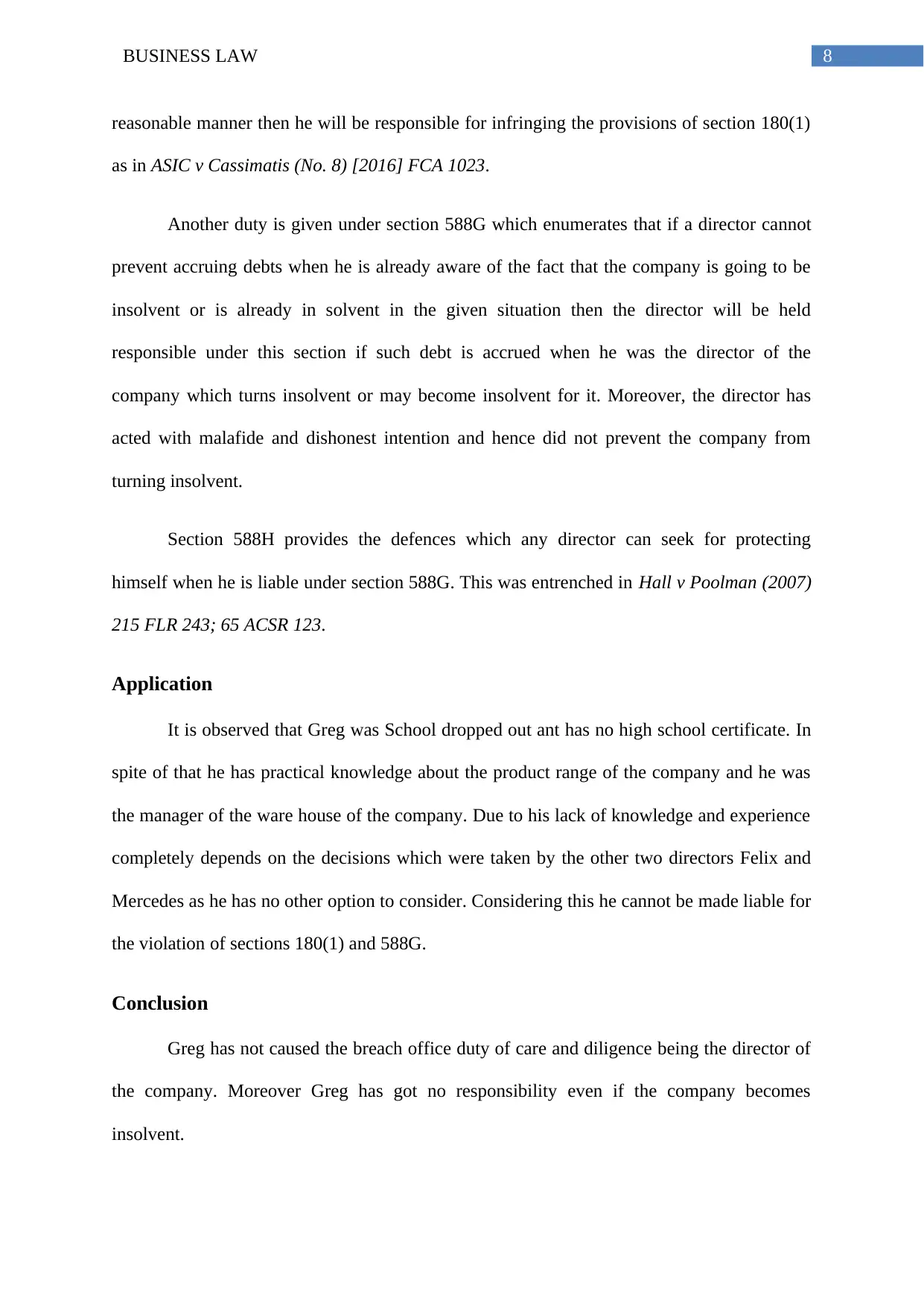
8BUSINESS LAW
reasonable manner then he will be responsible for infringing the provisions of section 180(1)
as in ASIC v Cassimatis (No. 8) [2016] FCA 1023.
Another duty is given under section 588G which enumerates that if a director cannot
prevent accruing debts when he is already aware of the fact that the company is going to be
insolvent or is already in solvent in the given situation then the director will be held
responsible under this section if such debt is accrued when he was the director of the
company which turns insolvent or may become insolvent for it. Moreover, the director has
acted with malafide and dishonest intention and hence did not prevent the company from
turning insolvent.
Section 588H provides the defences which any director can seek for protecting
himself when he is liable under section 588G. This was entrenched in Hall v Poolman (2007)
215 FLR 243; 65 ACSR 123.
Application
It is observed that Greg was School dropped out ant has no high school certificate. In
spite of that he has practical knowledge about the product range of the company and he was
the manager of the ware house of the company. Due to his lack of knowledge and experience
completely depends on the decisions which were taken by the other two directors Felix and
Mercedes as he has no other option to consider. Considering this he cannot be made liable for
the violation of sections 180(1) and 588G.
Conclusion
Greg has not caused the breach office duty of care and diligence being the director of
the company. Moreover Greg has got no responsibility even if the company becomes
insolvent.
reasonable manner then he will be responsible for infringing the provisions of section 180(1)
as in ASIC v Cassimatis (No. 8) [2016] FCA 1023.
Another duty is given under section 588G which enumerates that if a director cannot
prevent accruing debts when he is already aware of the fact that the company is going to be
insolvent or is already in solvent in the given situation then the director will be held
responsible under this section if such debt is accrued when he was the director of the
company which turns insolvent or may become insolvent for it. Moreover, the director has
acted with malafide and dishonest intention and hence did not prevent the company from
turning insolvent.
Section 588H provides the defences which any director can seek for protecting
himself when he is liable under section 588G. This was entrenched in Hall v Poolman (2007)
215 FLR 243; 65 ACSR 123.
Application
It is observed that Greg was School dropped out ant has no high school certificate. In
spite of that he has practical knowledge about the product range of the company and he was
the manager of the ware house of the company. Due to his lack of knowledge and experience
completely depends on the decisions which were taken by the other two directors Felix and
Mercedes as he has no other option to consider. Considering this he cannot be made liable for
the violation of sections 180(1) and 588G.
Conclusion
Greg has not caused the breach office duty of care and diligence being the director of
the company. Moreover Greg has got no responsibility even if the company becomes
insolvent.
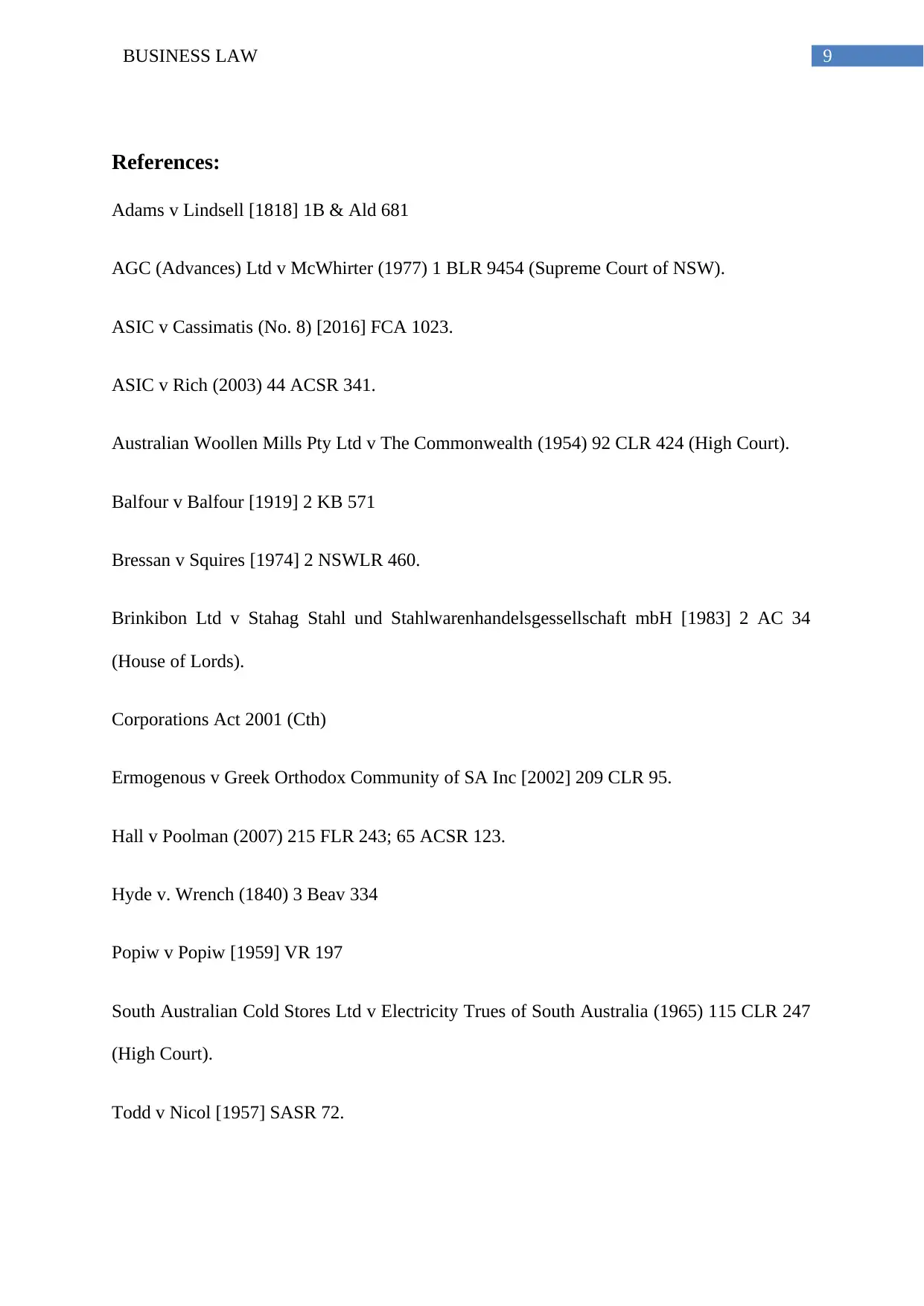
9BUSINESS LAW
References:
Adams v Lindsell [1818] 1B & Ald 681
AGC (Advances) Ltd v McWhirter (1977) 1 BLR 9454 (Supreme Court of NSW).
ASIC v Cassimatis (No. 8) [2016] FCA 1023.
ASIC v Rich (2003) 44 ACSR 341.
Australian Woollen Mills Pty Ltd v The Commonwealth (1954) 92 CLR 424 (High Court).
Balfour v Balfour [1919] 2 KB 571
Bressan v Squires [1974] 2 NSWLR 460.
Brinkibon Ltd v Stahag Stahl und Stahlwarenhandelsgessellschaft mbH [1983] 2 AC 34
(House of Lords).
Corporations Act 2001 (Cth)
Ermogenous v Greek Orthodox Community of SA Inc [2002] 209 CLR 95.
Hall v Poolman (2007) 215 FLR 243; 65 ACSR 123.
Hyde v. Wrench (1840) 3 Beav 334
Popiw v Popiw [1959] VR 197
South Australian Cold Stores Ltd v Electricity Trues of South Australia (1965) 115 CLR 247
(High Court).
Todd v Nicol [1957] SASR 72.
References:
Adams v Lindsell [1818] 1B & Ald 681
AGC (Advances) Ltd v McWhirter (1977) 1 BLR 9454 (Supreme Court of NSW).
ASIC v Cassimatis (No. 8) [2016] FCA 1023.
ASIC v Rich (2003) 44 ACSR 341.
Australian Woollen Mills Pty Ltd v The Commonwealth (1954) 92 CLR 424 (High Court).
Balfour v Balfour [1919] 2 KB 571
Bressan v Squires [1974] 2 NSWLR 460.
Brinkibon Ltd v Stahag Stahl und Stahlwarenhandelsgessellschaft mbH [1983] 2 AC 34
(House of Lords).
Corporations Act 2001 (Cth)
Ermogenous v Greek Orthodox Community of SA Inc [2002] 209 CLR 95.
Hall v Poolman (2007) 215 FLR 243; 65 ACSR 123.
Hyde v. Wrench (1840) 3 Beav 334
Popiw v Popiw [1959] VR 197
South Australian Cold Stores Ltd v Electricity Trues of South Australia (1965) 115 CLR 247
(High Court).
Todd v Nicol [1957] SASR 72.
⊘ This is a preview!⊘
Do you want full access?
Subscribe today to unlock all pages.

Trusted by 1+ million students worldwide
1 out of 9